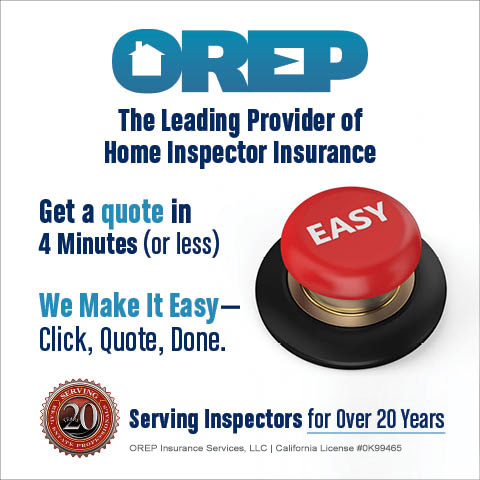 | > E&O/GL Insurance for Home Inspectors Competitive Rates, Broad Coverage, Free Risk Management, online inspection support for tough questions, discounts on education and more... Professional Coverage, Competitive Pricing Shop OREP today! |
>> Editor’s Note: To help you stay up-to-date and connected, OREP/Working RE has established a Coronavirus (COVID-19) Discussion and Resource Page where you can share your thoughts, experiences, advice and challenges with fellow inspectors. See what Inspectors are saying here!
“Perhaps the most controversial topic in home inspection practices is not even a requirement of any standard. I like to call it ‘the elephant in the room.’ The discussion of code compliance. We can choose to ignore it, never mention it, or disclaim it, but it always seems to still be there.”
Home Inspections and Codes
By Mike Twitty, ACI
Home inspections provide an evaluation of a specific property with a detailed written report that describes that property on that particular day. The evaluation includes reporting on any present or future potential concerns that could affect the property condition or safety of the occupants.
Determining what should or should not be reported often varies from one inspector to the next. While many concerns are obvious, others are not and require experience on the part of the inspector to be able to identify. Other parts of the equation are observed items that fall into a “gray area” as far as their significance as a concern, and whether or not they should be listed in the report. Making that decision is up to each inspector and varies widely in opinions. When preparing the report, inspectors are required to follow a standard of practice for licensed states and/or an association they are members of. The standards specify what “shall” be reported and described. All inspectors should design their report templates to properly include these requirements.
Perhaps the most controversial topic in home inspection practices is not even a requirement of any standard. I like to call it “the elephant in the room.” The discussion of code compliance. We can choose to ignore it, never mention it, or disclaim it, but it always seems to still be there.
Section 13.2(8) of general exclusions of the ASHI standards states:
The inspector is NOT required to determine: compliance of systems and components with past and present requirements and guidelines (codes, regulations, laws, ordinances, specifications, installation and maintenance instructions, use and care guides, etc.).
So, there you have it. Totally off the hook, right? Well, it’s not that simple. Questions concerning code compliance are extremely commonplace from prospective home buyers. It’s inevitable; as an inspector, you will face questions about it.
Probably, the hottest topics among home inspector groups on social media or chat forums involve the discussion of codes. That in itself can cause confusion and problems. Arguments often arise from these discussions with “keyboard experts” offering their advice. Sometimes, correct answers and references are given, but unfortunately, too often, bad and incorrect information is posted.
Discussions routinely become heated with personal attacks on other participants. It can get really ugly, real fast. Forums can be a credible source of information if handled and moderated professionally, and with respect. My advice would be to never take an answer or opinion from a forum to use in a report without further research. The forum information can be a good starting point to use for a closer look. Whether it be a code reference, manufacturers specification, or industry standard, always confirm accuracy before signing your name to it. Discussion forums are not a viable substitute for proper educational resources.
Citing Codes
In general, citing building codes can be a very complicated process. The two most relevant code references home inspectors will use are the International Residential Code (IRC) and the National Electric Code (NEC). Both are updated and republished every 3 years. Examples of the chronology are: IRC follows the years 2015, 2018, 2021, etc. and the NEC follows 2014, 2017, 2020, etc.
The primary reasons for complications are:
- Adoption Dates: All government jurisdictions decide independently when to adopt new codes. Just because a new edition is available, does not mean it is always adopted. That decision is made by each state, county, or municipality’s legislators/elected government officials. Code hearings are usually held to allow public input. This often involves lobbying both for and against by contractors, business owners, and private citizens. It can become a very politically influenced process. When a new code edition is adopted, there is a specific adoption date stated. This is normally when the code becomes law in that particular jurisdiction.
- Implementation Dates: The implementation date is just that. It is when the code actually becomes enforceable. “Adoption” dates are often several months prior to the actual “implementation.” Until the newly adopted code edition is implemented, the previous code is still in effect.
- Date of Building Permit: Building permits generally have an issue date and an expiration date. Although it may vary, most jurisdictions allow the issue date of the building permit to determine which code edition should be used. Even if a newer code is adopted and implemented, the code that was in effect at the issue date is allowed until that permit expires. Many permits have a 2-year effective timeline window.
- Amendments: Amendments are revisions, deletions, additions, or any other changes to the text of the adopted code. Local governments decide what amendments to include in the adopted code in their jurisdiction. They can make requirements more stringent or less stringent. Knowledge of local amendments is critical for anyone that references code citations in their report. They are often obscure to those researching government websites for code regulations. Government websites themselves are notorious for being outdated and often don’t include the most recent adoptions. There are even still some local governments that have no building codes at all.
- Interpretation: This one can be a biggie. Not all code requirements are cut and dry. Sometimes the verbiage can be vague and ambiguous. Different jurisdictions often disagree over the same code article. Over time, as new editions are produced, they are re-worded and clarified to be more concise when difficulties in interpretation arise.


The chart (See Figure 1) is an example of adoption/implementation dates of various editions of the NEC by states. The color code relates to which code edition was adopted. As you can see from Figure 2, it is a constantly moving target.
(story continues below)

Learning More About Codes
If you decide that you’re so inclined, learning to use building codes for reference is not overly difficult. The biggest challenge is to become proficient at finding specific information on time. Some home inspectors choose to become certified code inspectors by taking a certifying exam. There are several categories to choose from that concentrate on the different building systems. These exams are given and certified by the International Code Council (ICC) and the International Association of Electrical Inspectors (IAEI). ICC and IAEI have a reciprocal agreement to honor each other’s certification. The exams are timed, so finding references quickly is important. Generally, residential exams are 2 hours and have 60 multiple-choice questions. Commercial exams typically are 3.5 hours and have 80 questions.
Education is the biggest benefit one can get from becoming certified. Much can be learned from preparing for an exam, whether or not one decides to refer to codes in their inspection business. Continuing education is required to maintain certification. I once took two exams back-to-back and passed, but it was totally exhausting. I would not recommend taking more than one at a time.
Code compliance inspectors (also known as AHJs; authority having jurisdiction) have a distinct advantage over home inspectors in their duties. They normally have a specific system to inspect, (electrical, plumbing, mechanical, building inspector etc.), and are working with a particular edition of an adopted code. They are trained to know what amendments are in effect in their jurisdiction, and primarily are only involved in new construction. That is a huge advantage over the average home inspector, who may work in several different jurisdictions in the same week, not to mention the property age could range from new construction to hundreds of years old and cover several code cycles.
So What?
So now we go back to the obvious question: should home inspectors include code compliance references in their business? It is a personal choice. Unless you are willing to do the research and homework, my advice would be a resounding NO! However, if you put in the work and do it accurately, nothing is wrong with it. It can even be a professional skill qualification to advertise if done properly and with discretion. Just be sure to explain in writing that although some code references and violations may be in the report, the inspection is not for code compliance.
Codes are in place to provide safety for people and to protect property. Home inspections provide the same benefits. Deficiencies and concerns can be successfully communicated without ever mentioning the “C” word. Home inspectors should always explain the possible implications of a missing flashing or lack of ground fault protection. The consequences of such concerns are obvious and a code reference is not necessary when properly explained. Safety should always be the primary objective regardless of whether a code requirement is followed or not. “Grandfathering” should never exempt safety. Conversely, if a code reference will serve to persuade a hard-headed builder or contractor to make a repair, I say use it. Don’t be afraid to call the local AHJ/building official to confirm a specific requirement or report a violation. When included in the discussion, they are the enforcers and usually resolve issues in short order. A common argument I often hear is: “we are not code inspectors.” While this statement is basically true, I like to think we are a step above that in the services we provide. And, whether we like it or not, there still is a large pachyderm in the house.
About the Author
Mike Twitty has recently retired from a 17-year home inspection and compliance inspection career. He is a licensed electrician, and is certified by the ICC and IAEI as a residential building inspector and residential electrical inspector. Mike currently provides continuing education training for home inspectors across the country on electrical subjects and has authored many technical articles for national publications.
OREP/WRE Coronavirus Discussion and Resource Page
Coronavirus: National Home Inspector Survey
Real-Life Inspector Lawsuits and How to Protect Yourself
Available Now
Presenter: Isaac Peck, President of OREP
Isaac Peck, President of OREP Insurance Services, shares his insights and advice gained over nearly 10 years of providing risk management and E&O insurance for home inspectors. You will not hear many of these insights anywhere else.
Watch Now!
Send your story submission/idea to the Editor:
isaac@orep.org
Note: The Winter/Spring 2022 Working RE Home Inspector is now mailing to over 25,000 home inspectors nationwide. OREP Insureds/members enjoy guaranteed delivery of each print magazine and many more benefits.



by David Michael Green
In Kentucky it is a violation of State law for a licensed home inspector to report any code compliance issue either in their report or verbally to clients. Such violation could result in disciplinary action by the Board of Home Inspectors up to and including license revocation. More states need to build this wall between home inspectors and codes. It is amazing how many egg heads try to say that what we do came from codes and continues to be based on codes. After nearly 40 years in this business, I assure you codes had nothing to do with it!
-by Inspector Mike®
Same here in Ohio David. Well said. Home inspections have nothing to do with code. – Inspector Mike®
Great article
-